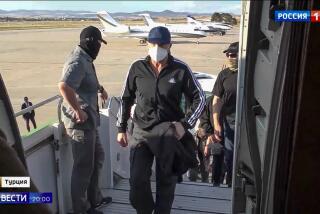Cold War Thaw May Solve ‘Poison Umbrella’ Murder : Bulgaria: Georgy Markov felt a sting as he crossed a bridge in London in 1978. Four days later, he died.
- Share via
SOFIA, Bulgaria — It was pure Cold War intrigue--the mysterious execution on London’s Waterloo Bridge of a Bulgarian defector and one-time close friend of the country’s Communist leader.
It was as dramatic as anything from the pages of a John le Carre novel. Writer and playwright Georgy Markov died from a massive dose of poison--contained either in a bullet or the tip of an umbrella that jabbed into his thigh as the assassin passed him on the bridge crowded with pedestrians.
That was September, 1978, and for more than 11 years, the riddle of Markov’s death remained locked on the other side of the Iron Curtain in Communist Bulgaria. But the winds of political change that have brought a new freedom to the nations of Eastern Europe may also now shed light on such incidents as Markov’s death.
On Wednesday, two months to the day after Todor Zhivkov was overthrown, Markov’s British-born widow, Annabel, entered the Communist Party’s forbidding Central Committee headquarters building in Sofia and was promised that authorities of a new Bulgaria will conduct a full investigation into her husband’s death.
In the course of a 30-minute meeting with Central Committee Secretary and senior Politburo member Alexander Lilov, Markov said there was no direct admission that her husband had been killed on specific orders from Zhivkov but that there were hints.
“He said this had been a terrible time for Bulgaria and that things happened which should not have happened,” she said. “He said he would help me in any way he could in the future, and with any problems (I might have) in publishing my husband’s works.”
Georgy Markov was 49 when he died. He had been working in the Bulgarian Language Service of the British Broadcasting Corp.’s World Service in London, where he helped prepare information for broadcast into Bulgaria.
During his years in favor, Markov had been one of his country’s leading writers and intellectuals, a privileged individual who met frequently with Zhivkov and other government leaders. But in 1969, at the age of 38, Markov wrote a play, “The Man Who Was I,” a controversial work produced in the aftermath of Czechoslovakia’s Prague Spring reform movement.
“He knew it was provocative,” his widow told a small group of reporters Wednesday. “There was trouble. . . . They suggested he might find a way out.”
Within months, Markov had defected, first to Italy, where his brother lived, then to West Germany. Eventually, he wound up in London, where he worked for the BBC but also continued to write--a decision that most likely led directly to his assassination.
She said the threats began almost immediately, passed to Markov’s brother via another Bulgarian exile in the West.
On Sept. 7, 1978, as Markov crossed the bridge, he felt a sting of pain in his thigh and saw a man quickly open an umbrella and disappear. He died four days later.
Markov said her husband believed he had probably been shot and that the umbrella had been used by the assassin to prevent him from being recognized. However, the British media, captivated by the idea of a twist to the case worthy of a James Bond thriller, never wavered from its own view that the umbrella had carried a poison tip.
A British defense research laboratory diagnosed the poison as ricin, a derivative of the castor oil plant that is grown in both Hungary and Czechoslovakia.
“I’m not a bitter person,” Annabel Markov said. “I’ve had a good life. It was always something in the background that you hoped someday . . . would be settled. It’s very important for Bulgaria that it be settled so that this kind of thing can never happen again.”
More to Read
Sign up for Essential California
The most important California stories and recommendations in your inbox every morning.
You may occasionally receive promotional content from the Los Angeles Times.












